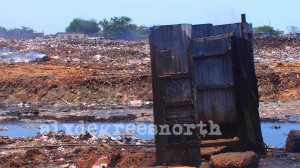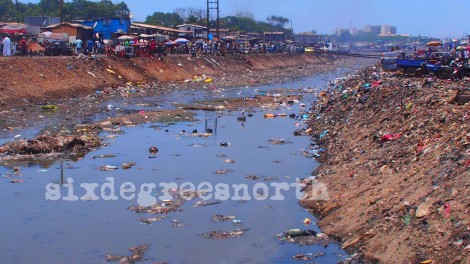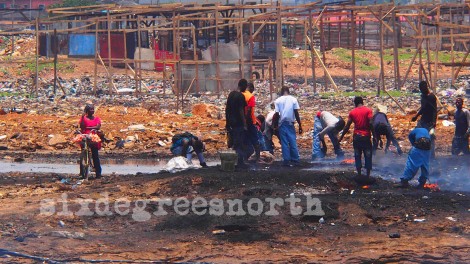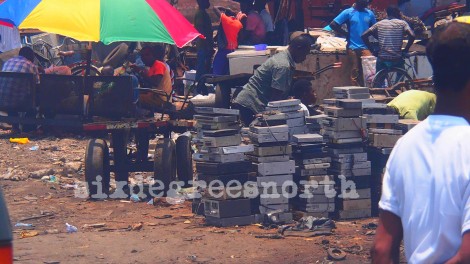Over the last three years in Ghana I have seen desperately poor, tiny villages. I have seen the hopelessness of mentally ill, homeless people. I have seen simple, heart-breaking poverty. But I have never seen anything like Agbloboshie. It’s not far from central Accra, close to Korle Bu Teaching Hospital on the banks of Korle Bu lagoon. Locally it’s known as Sodom and Gomorrah. They were twin cities razed by God with ‘hellfire and brimstone’ as punishment for men’s sins, but has now come to be associated with a hell on earth. Perhaps you’ve heard of Agbloboshie, as it is a well known dumping ground for e-waste from around the world, and has the dubious claim of being one of the 10 most polluted places on earth.
Agbloboshie is easy enough to visit, a simple taxi ride will take you there. My daughters, some interested friends and myself recently took a tour, though the word tour seems contrary to the life there. Adjacent to one of the extensions of Makola Market, Agbloboshie is a slum, home to over 50,000 people. From a distance it resembles a patchwork or mosaic, and your eyes struggle to distinguish one dwelling from another, for it is a labyrinth of tiny shelters made of cement blocks, scrap metal, wooden planks and tarpaulins. Part of the lagoon is so choked with plastic and discarded fridges and electronics it looks as though you could walk across. There is no running water outside of communal pumps, and power, like much of Ghana, is patchy at best. Wider streets of dirt, broken cement blocks and masses of rubbish give way to narrow lanes no wider than a person. As you pass into these narrow lanes, it takes a moment for your eyes to adjust to the darkness, the ground is uneven and you need to watch your step carefully. Sanitary infrastructure is limited to shared, filthy toilets or small cubicles make of scraps of tin which drain directly into Korle Bu lagoon, or people urinate directly in the streets and gutters. As we passed through this labyrinth, all I could think of was a mediaeval sprawl, with the darkness, the mud and the deprivation. In these close living spaces I thought a little about Ebola, but more about Cholera. Amidst the endless discussions on Ebola, Ghana has been experiencing a cholera epidemic, and while statistics are now declining, over 27,900 cases have been reported with 217 deaths (as of 29 November 2014).
But why would you visit such a place? Why would we want to take this voyeuristic journey into deprivation? While I had always been interested in visiting Agbloboshie, my second daughter was doing a science project which needed to be on a local issue which had ramifications beyond the world of science, so coincidently, she chose e-waste in Ghana. And while I was ‘tut-tuttted’ by some for taking my daughters to such a place, I thought the first hand experience of seeing where the waste of the first world completes it’s journey was a good opportunity for us all. But of course, what they learnt was more than about the e-waste. It was about endless desires of the developed world, about the trap of poverty and massive environmental degradation. I hadn’t actually heard the phrase ‘slum tourism’ before I visited Agbloboshie, but that is the term that slipped into my mind as we walked through the slum. The idea of slum tourism sits uneasily with me, like the celebrities, arriving like gods, choppered into starving African villages. What do these people gain from allowing us a window into their misery?
To visit Agbloboshie, you need a local guide, but this requires no previous planning. Alighting from a couple of taxis, any group of foreigners (of whatever colour or creed) are immediately recognisable. You will be approached by a local guide, who should pass on any money collected at the end of the tour to the local chief. While it is far from being a transparent process, at the end of our tour we were invited to visit the local chief to see the money being handed over. While we declined, I do hope the money was spent on the community.
Our guide was helpful and interesting, answering our questions in a matter of fact manner. While we were expecting to just see the e-waste, it was really a tour of the slum. We passed along the edge of Korle Bu lagoon, one of the most polluted waterways in the world. Stagnant water with bare banks littered with rubbish, a dead waterway. Our guide told us that when he was a child people would come for picnics in the grass along the banks of the lagoon. Even today, we saw cows grazing on the far bank, the green grass splashed with the bright plastic of water sachets, plastic bags and wrappers. Turning into the lanes of Agbloboshie, we passed tiny shops selling used motor oil and discarded junk from the first world. Heading deeper into the slum were tiny houses, through whose open doors we saw women preparing food. Some smiled, some met our eyes and some stared straight through us. Our new clothes and good shoes were for me an embarrassing symbol of all we had and they had not. Walking deeper into the tarpaulin covered lanes, my daughter pointed out the number of cigarette butts on the ground, a rare site in Ghana. I told her I did not know what it meant, but as the wafts of marijuana and the beat of the music grew stronger, I felt increasingly uneasy. We walked through a small room, with doors on both sides. Men with glazed eyes and blank expressions sat around the room, and beautiful, young girls, with elaborate hair, excessive make-up and short, cheap, inappropriate western dresses smiled at us. I will never forget their gentle sad eyes which met mine as they shyly stroked the arms of my daughters as we walked through.
Back in the bright sunshine, in the smell and the heat of midday along the stinking banks of the lagoon again, we could see on the far side of the water clouds of black smoke, for we were approaching the e-waste site. Piles of discarded plastic, the backs of tv sets and computers, gave way to scorched earth of blackened dirt and plastic. Groups of men and boys clustered around fires, retrieving the metals left after the burning. Behind them acres of plastic waste spread out like an apocalyptic carpet. Seeing us take photographs, they tried to make us stop, but the narrow lagoon in front stopped any confrontation. I can only guess they were ashamed of the way they earnt a living, not knowing that we were sympathetic observers. We crossed the lagoon again and walked through an African market, like the countless others on this continent. After a few hours walking in the heat and stink, we were starving. Catching a smell of meat cooking on an open charcoal fire, my (near) vegetarian daughter exclaimed, “That smells delicious”, only to be confronted by a dozen blackened cow’s feet for sale. We laughed, as did the kids playing fuzzball on a nearby table. The cane weavers, making huge beautiful baskets, which unfinished looked like starbursts, asked for their photographs to be taken. In the sunshine of the market, with some shared laughs and smiles between the mountains of produce, our humanity felt shared. Certainly we were still obvious foreigners, but away from the slum and our strange tourism in the communal space of the market, life felt almost normal again. As we hung around the entrance to Agbogbloshie at the end of our tour, waiting for the money to be donated to the chief, a cheery guy atop a ladder called down to us, “Hey, come live in the slum with us! It’s not as bad as it looks!”
E-waste is shipped to Ghana in containers marked ‘Second hand goods’ or even ‘Development aid’, where it can be purchased for ‘disposal’. The plastic cases of computers and other electronics are discarded, and with no waste disposal, accumulate in massive piles in the area. The electrical components are then burnt so the metals in the circuitry can be collected, and sold as scrap metal. It is a common sight everywhere in Accra (and elsewhere) to see men pulling trolleys of scrap metal. These trolleys filled the lanes around the main street of Agbogbloshie, waiting to be recycled. The health of the men and boys doing the burning is obviously affected by their work. Our guide told us that lung and stomach cancers were common. There is also the obvious ramifications of a lack of education and opportunity for these boys, in addition to pressing health concerns. This is not to forget the release of toxic chemicals into the waterways and land, or just the colossal amount of rubbish generated by the ‘recycling’.
I usually try to finish on a positive note, but the waste, the environmental degradation, and the poverty of Agbogbloshie felt utterly overwhelming. Sodom and Gomorrah is a heady combination of the developed world not taking responsibility for their wanton consumer desires, unscrupulous traders sending the waste to Ghana, the government for allowing this importation to continue and their near complete lack of service provision, and the complications of the poverty trap of the residents of Sodom and Gomorrah.
And me? While I still feel very unsettled by the idea of slum tourism, I’m still pleased we visited. I can offer no solution to the problems of Agbogbloshie. While it is important for outside eyes to see places like this, and on a wider scale, for glamorous celebrities to highlight the plight of another African disaster, I find the longer I live here, the more confused I am and the less I understand about poverty, aid and service provision. While a couple of hundred million dollars might ensure a rehabilitation of the area, the fundamental problems of service provision, employment and responsible waste disposal are a longer term and fundamentally more difficult problem. Aid has come a long way in the last few decades, with more focus on empowerment than the well meaning bandaids (pun intended) of the developed world. On a local scale, aid can make significant, and one hopes, long term improvements to people’s lives. But an attitude of aid dependancy and slum tourism is so complicated. Maybe the only thing I can glean from our visit is the incontrovertible fact that the world is a deeply connected place. That old tv you donated to charity probably didn’t provide hours of entertainment to an underprivileged family, but a few cedis of scrap metal.
http://www.scientificamerican.com/article/10-most-polluted-places-in-the-world/
http://www.theafricareport.com/West-Africa/ghana-e-waste-pollution-plagues-accras-agbloboshie.html
http://www.blacksmithinstitute.org/new-report-cites-the-world-s-worst-polluted-places.html










I’m glad you were brave enough to walk inside the gates to Sodom and Gomorrah. Every time I drove by that place in a taxi, I longed to see it for myself. Thanks for doing it for me. What a great thing to teach your children!
LikeLike
Thanks Camille, it was very interesting, not to mention depressing for myself and the girls. It caertainly makes you ever thankful for what we have. Love to you both. C
On Fri, Feb 13, 2015 at 1:27 PM, six degrees north wrote:
>
LikeLike
I respect your first hand experience and perception of this contemporary problem. Your views are even echoed by many Ghanaians’ abroad who are continually frustrated by the lack of political progress and commitment to addressing these poverty issues like this one. I prefer a balanced perspective when looking at poverty, which is a world wide issue by the way. First world poverty in countries like Canada and Australian are just as complex and government initiatives have failed (specifically for indigenous aboriginal people ). Here is a link to a story of hope and change http://www.blacksmithinstitute.org/blog/photos-transforming-agbogbloshie-from-toxic-e-waste-dump-into-model-recycling-center/
LikeLike
Thanks Abe, I really appreciate you taking the time to comment. I am certainly not pointing the finger just at Ghana, but the entire mass consumerism that is rampant across the developed world. Having worked in remote Aborginal communities of Australia’s Northern Territory I have seen terrible disadvantage. But Agbogbloshie presents so many complex problems in one place. The new recycling plant at Agbogbloshie is certainly a step in the right direction. Thanks for sharing the link, but there is still the problems of waste disposal and the developed world not taking responsibility for their own waste. Difficult, challenging and confronting indeed. Thanks again.
On Fri, Feb 13, 2015 at 3:36 PM, six degrees north wrote:
>
LikeLike
Thanks for a really interesting insight. I remember walking through a slum while in Brazil and it’s so hard to reconcile our lifestyle with what these people have to live on. I had never heard of e-waste either so thank you for opening my eyes to that as well.
LikeLike
Thanks for commenting, I think you are right, when you see a slum first hand, reconciling our life of excess is very difficult indeed.
On Fri, Feb 13, 2015 at 3:36 PM, six degrees north wrote:
>
LikeLike
A really well written piece on a part of Accra most people who live here dont wish to know too much about. I took ‘One Direction’ there a couple of years back and it remains to this days as one of the most emotional trips I have taken while in Ghana. I can still remember the scent to this day but what was even more overpowering was the warmth we received from the local inhabitants. The sort of place you can not even imagine until you go there. Well done for visiting and really good to see people writing about this place.
LikeLike
Thanks for taking the time to comment Duncan. When you say ‘One Direction’ do you mean the band? If so, that’s certainly off the familiar path of touring. Well done!
On Fri, Feb 13, 2015 at 5:03 PM, six degrees north wrote:
>
LikeLike
Very interesting piece, Chrissie (as always). Provides a great insight into one of the very significant downsides to our rampant consumerism in the first world, to which we usually only give fleeting, if any thought.
LikeLike
Richard – not sure what you mean! Are you blaming the first world for this?
LikeLike
I think Richard rightfully y is placing the blame on the ‘first world” it is our waste and enviormentsl laws that Ewaste does not get into our land fields. So it gets shipped out to places like Ghana.
LikeLike
Thanks Richard, I think we don’t want to give it too much thought as it makes us feel guilty, but it’s not just a first world problem, it’s all the complications of lack of input from this side too.
On Fri, Feb 13, 2015 at 7:59 PM, six degrees north wrote:
>
LikeLike
beautifully written as always…I love your reflections on how the more you see, the deeper you understand and the less you know. the world is a complex place, and there are no quick fix solutions…. I see this area esch time I go to work, smell the burning and the rest of accra’s dumped faecal waste, and see the trash pickers amongst it…and I hear the stories from clients who live there…but there are all sides to hell.. and in this particular hell, apparently there is community, mutual care and some sense of belonging, as well as the darker side to life. something I think we could all learn from……
LikeLike
Thanks Karen, you see a side of life not many expats in Accra do and I really value your thoughts. Your comment ‘there are all sides to hell’ really resonated with me. From the other end of the privilege spectrum, another friend of mine says ‘there is no paradise’, we all carry a little hell with us, and maybe the hell of Agbogbloshie carries a little more too. It’s just the compounding complexity of the problems that make me sad and disillusioned.
On Sat, Feb 14, 2015 at 10:41 AM, six degrees north wrote:
>
LikeLike
Chris, you shook me really hard with this post. It is hard to accept so i had to step away for a day before i could respond. I keep thinking i am a active person in my personal and political life but i gotta get off of my Butt even more. You are STILL much appreciated for all that you do via your blog.
Donald
LikeLike
Thanks as always for your comment Donald. The problems with places like Agbogbloshie are so multi-layered and complex they seem (to me at least) utterly overwhelming. With respect to what we can do, one of my favourite sayings is that the raindrop never blames itself for the flood.
On Sat, Feb 14, 2015 at 7:54 PM, six degrees north wrote:
>
LikeLike
Really well written piece on this most horrific place. I had occasion to drive past Agbobloshie very late one night on the way back from Korle Bu Hospital. That’s when they light the fires and burn all the rubbish and e-waste. The fire cased a huge pall of black toxic smoke over the city and the hospital.
LikeLike
Thanks Stuart. You know the complexity of problems in Ghana better than most people I know. Let’s try and catch up for a coffee soon.
On Sat, Feb 14, 2015 at 8:31 PM, six degrees north wrote:
>
LikeLike
Thank you for sharing your tour and your insights. You described well that helpless feeling we have when confronted with extreme poverty. In the 20 years we lived in the Philippines, we saw a lot of poverty, and yet we also saw a lot of simple joy. Once a priest took some of us into Manila’s largest slum. It was also on the edge of a garbage dump. I found it embarrassing to walk around the slum like a tourist, looking at how they live. Yet it seems like an act of cowardice to be afraid to look. Either way, one is left with the dilemma of not being able to fix their poverty or the world’s extreme inequality.
LikeLike
Thank you for your comment, particularly the part ‘it seemed like an act of cowardice not to look’…you sum up the complexities perfectly. Thanks
On Sun, Feb 15, 2015 at 3:15 AM, six degrees north wrote:
>
LikeLike
A great article. It reminds me of my visit last year. It is a complex issue with no easy answers but raising awareness is a step in the right direction. Not just for e-waste but all the other waste that gets dumped in Africa too.
LikeLike
Sounds remarkably similar to West Point, Liberia. The Plasticocene global “event horizon” sediments will be thickest in offshore west Africa.
LikeLike
The Plastiocene has a much better ring to it than the Anthropocene….but just as depressing.
LikeLike
Wow – delighted to have found you – what a great blog. I spent some time in Ghana a few years back (in Hohoe) and although it was much poorer than Accra or Kumasi, it was nothing like this. I always found it fascinating out there how everyone would share their food, even if they were homeless. It’s something that’s just disappeared from Western culture and is such a shame. Am going to keep reading your blog 🙂
LikeLike
very interesting article. certainly a compex issue that needs to be adressed locally and internationally. The exposure/ awareness is certainly in the right direction.
LikeLike
Oh dear Lord. I remember driving past there, and that lake so polluted it was as black as tar, awful. I allways find it hard to believe that E-waste is actually being shipped to Ghana but accounts such as yours makes it a reality one cannot ignore.
LikeLike